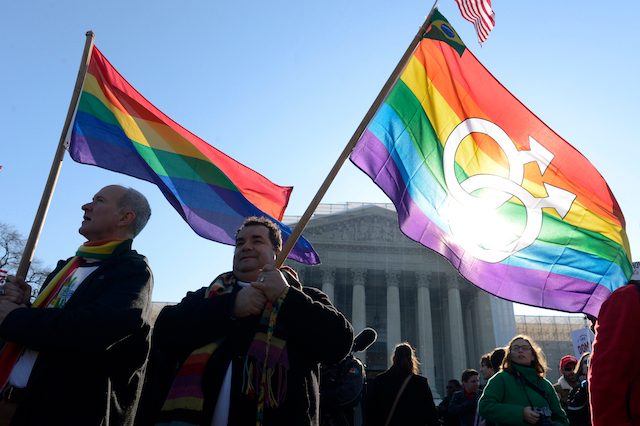SUMMARY
This is AI generated summarization, which may have errors. For context, always refer to the full article.

WASHINGTON DC, USA – The US Supreme Court will hear arguments Tuesday, April 28, on whether gay couples have a constitutional right to wed – a potentially historic decision that could see same-sex marriage recognized nationwide.
Hundreds of activists from both sides of the debate were expected to rally in front of the Supreme Court building as the 9 justices hear a case on one of the most divisive social issues in the United States.
Already, thousands of Americans protested over the weekend in Washington, with some camping out in front of the court to ensure a seat in the courtroom come Tuesday.
Experts say recognition of same-sex marriage – already legal in 37 of the country’s 50 states and in the capital Washington, DC – seems inevitable.
The court will hear from plaintiffs from 4 states – Ohio, Michigan, Tennessee and Kentucky – where gay marriage is still barred.
Supported by US President Barack Obama’s administration, the 16 plaintiffs want to legally marry. But their home states define marriage as being between a man and a woman, and do not recognize gay marriages carried out elsewhere in the country.
If the Supreme Court rules on these 4 states, it will be making a de facto decision on all 13 states banning gay marriage.
At issue is the Supreme Court’s interpretation of the 14th Amendment of the US Constitution, which provides equal protection under the law.
Justices must decide if this amendment means states must allow gay marriage, and whether states are required to recognize same-sex marriages that were conducted in other states.
In a landmark decision in June 2013, the court struck down a law denying federal benefits to homosexual couples.
But it stopped short of legalizing same-sex marriage nationwide, leaving that question to the states – even though the court traditionally protects federalist principles.
Who can be married?
The 4 states involved, which are backed by religious and conservative organizations, argue that marriage is based on the biological compatibility of a man and woman.
But the Michigan plaintiffs argue that “whatever limits may be imposed on the right to marry, the gender of the partners cannot be one of them.”
They also maintain that the 4 states in question violate their freedom to travel by refusing to recognize their legal marriages carried out in other states.
The Department of Justice, which is backing the plaintiffs, believes the matter is a question of discrimination based on sexual orientation.
Conservative Justice Anthony Kennedy, who has sided with gay rights proponents in the past, is expected to join with the four progressive justices to render a decision allowing gay marriage nationwide.
Despite its 5-to-4 conservative majority, the court has largely sided in favor of same-sex couples in recent years.
“In effect, the court allowed same-sex marriages to move forward in those jurisdictions, making it all the more difficult to roll back marriage equality now,” said constitutional law professor Steven Schwinn of the John Marshall Law School in Chicago.
In a sign of the case’s divisive nature, a record of more than 150 briefs – 20 by the parties and 130 amicus curiae or “friend of the court” briefs – have been filed ahead of the hearing, in an attempt to persuade the justices. – Chantal Valery, AFP / Rappler.com
Add a comment
How does this make you feel?





There are no comments yet. Add your comment to start the conversation.